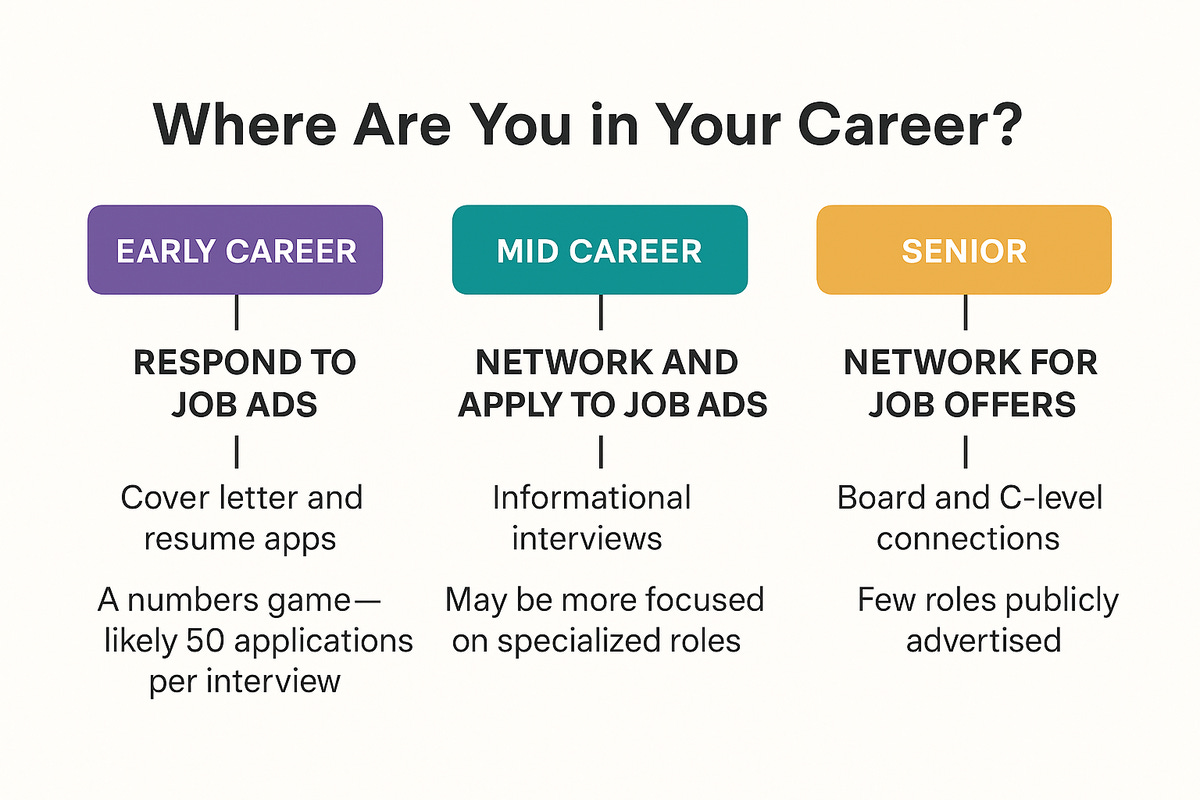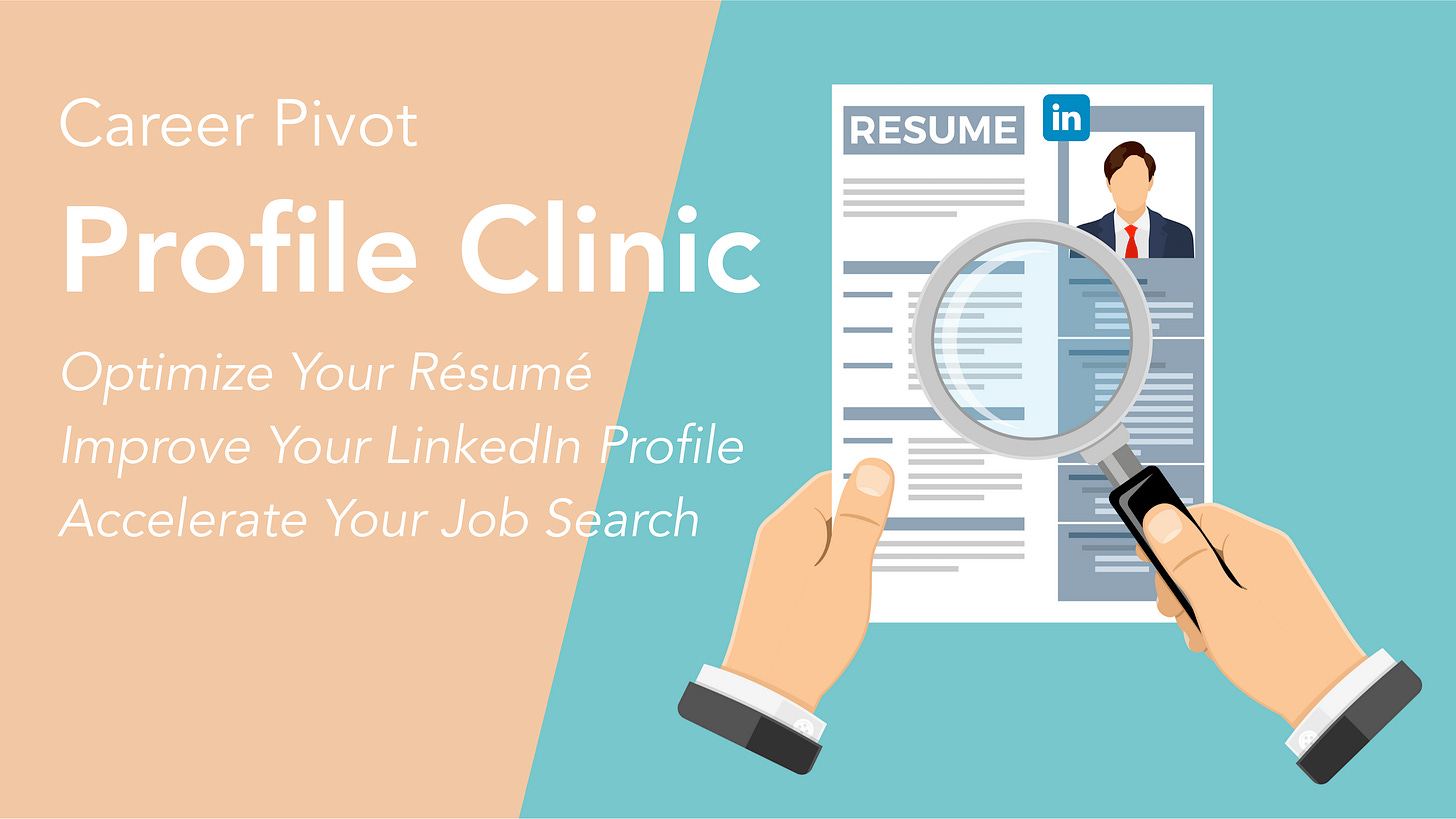Job Search Flowchart: How to Get Hired in 2025
You have choices. Not all of them are equal. None are easy. Welcome to the Job Search: 2025 Edition
I’ve been preaching the power of informational interviewing on Career Pivot from the start. All the research, recruiters, and career coaches agree that it is the most effective way to find senior-level roles in 2025.
However, not everyone is senior-level.
I recently asked people how they found a job, and I was surprised by the result.
Blindly sending in job applications does work for some people. Not everyone, and maybe not you, but enough that I have changed my outlook on responding to job ads. They can work for junior staff and highly specialized roles.
I’ve also changed how I do Career Pivot Profile Clinics, to focus on your situation and your needs depending on your experience level.
Finding Your Path in a Brutal Market
The 2025 job market is unforgiving. Qualified candidates are getting ghosted. Dream jobs vanish without explanation. We're all scrambling to figure out which approach will actually work.
Your approach should depend on where you are in your career. Early-career professionals need a different playbook than C-level executives.
The Central Question: Where Are You in Your Career?
Before you send another application into the void, ask yourself this: Are you:
Early-career with 0-5 years of experience
Mid-career after 5-15 years of employment
Senior-level with 15+ years of leadership
This isn't about age or ego. It's about recognizing what actually works at your career stage and playing to your strengths instead of fighting against market realities.
Early career professionals can rely more on volume and persistence, while mid- and senior-level professionals can leverage their networks and focus on building relationships to find hidden job opportunities.
Early Career: Welcome to the Numbers Game
If you're early in your career, we need to be honest about what's ahead. You don't have the network yet. You can't call up former colleagues for insider information. Your LinkedIn connections probably include your college friends and people you know informally.
Your primary strategy: Volume and persistence.
You'll be responding to job ads with cover letters and resumes. Yes, it feels impersonal. Yes, it's emotionally exhausting. You will be playing the numbers game when it's your most viable option.
According to Glassdoor, the average corporate job posting received 250 applications in 2019. In 2025, with AI-automated applications and LinkedIn’s Easy Apply (which you should never use), companies are getting 250 resumes in the first day.
You'll need to send 50-100 applications to land a single interview. You'll need several interviews before getting an offer. Like I said, the math is tough.
How do you survive this psychologically?
Essentially, you need to treat applications like a part-time job. Set daily targets. Track your metrics. Celebrate small wins like getting past automated screening systems.
Think of every application as teaching you something about positioning yourself. Every rejection gets you closer to the right fit.
Ghosting is rampant at this level. Companies will interview you enthusiastically, then vanish. Follow up professionally, but don't take silence personally. It reflects their process, not your worth.
Mid-Career: The Hybrid Approach
Mid-career professionals face a strategic choice point. Your approach depends heavily on how specialized your skills are.
If you're in a focused field like data science (MERL)
Job applications can work remarkably well. Hiring managers actively seek your specific technical skills, and applicant tracking systems actually help surface qualified candidates.
You can send in applications to job ads, and your numbers may be better than early-career professionals, but not by much. Expect a long slog if you are just relying on sending in job applications.
If you’re a program lead or grant manager
Networking becomes crucial, but you're not starting from zero like early-career folks. Your sweet spot is informational interviews with hiring managers. You have enough experience to warrant their time, but you're not so senior that they assume you're unaffordable.
NPR reports that 85% of jobs are filled through networking, and mid-career is where this statistic becomes personally relevant. You finally have enough professional relationships to leverage.
Start Connecting with Real People
Informational interviewing works. In fact, it is an introvert’s secret power.
Start with your existing network and have catch-up calls. Tell them you’re looking for work and would appreciate being connected to those they know in your preferred career direction.
Then connect with that second tier of people, and ask good questions, including who else you should speak with. Mid-career professionals often underestimate how marketable their skills are when transferring to new sectors.
You can mix informational interviews with strategic applications to jobs that deeply call to you. A hybrid approach for every mid-career professional.
Senior-Level: It's All About Relationships
Senior-level job searching operates in a different universe. These are roles that often aren't advertised publicly.
According to executive search recruiters, most senior positions are filled through board connections, C-level referrals, and executive networks built over decades.
Build relationship that lead to opportunities
This means investing in relationships that pay dividends months and years later.
Have coffee meetings with board members.
Speak at industry conferences.
Serve on nonprofit boards.
Meet other senior leaders in casual settings.
You can still apply to posted positions, especially if the fit is exceptional. However, be aware that you might be the "comparison candidate" who is brought in to validate a decision that's already been made through informal conversations.
2025 Job Search Reality
No matter your career stage, job searching is hard. Companies have broken hiring processes. Good people get overlooked. Sometimes the timing is just wrong.
But matching your strategy to your career stage gives you the best odds in an imperfect system.
Early-career professionals: embrace the volume game.
Mid-career professionals: strategically blend networking with targeted applications.
Senior-level professionals: invest in relationships over applications.
We all have our own paths to follow, and I can help you refine your path.
Sign up now for a 1-hour session with me that includes the following components. Your session will be customized to your experience and job search goals:
Discuss your candidate/market fit and dream role
Accelerate your job search process and focus on productive actions
Analyze your resume based on your desired job role with replicable tips
Improve your LinkedIn profile and optimize it for recruiters
You’ll also get an email follow up 10 days later to see how you’re doing and what you can improve. Bonus: I’ll make networking introductions for you!




